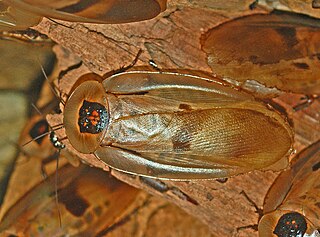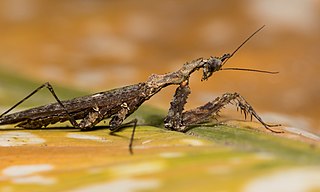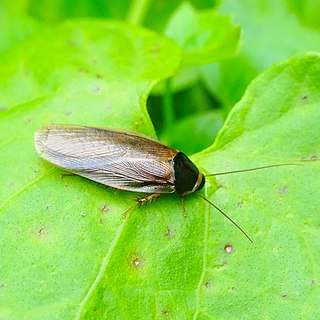
Giant cockroaches, or blaberids are the second-largest cockroach family by number of species.

Blattidae is a cockroach family in the order Blattodea containing several of the most common household cockroaches. Some notable species include:

The giant burrowing cockroach is also known as the rhinoceros cockroach, and Queensland giant cockroach. These cockroaches are native to Australia and mostly found in tropical and subtropical parts of Queensland. They are the world's heaviest species of cockroach and can weigh up to 30-35 grams and measure up to 7.5-8 cm (3.1 in) in length. It is a member of the family Blaberidae, which contains hundreds of species. It is part of the blaberid subfamily Geoscapheinae. It is prominent in the wild and can also be sold and kept as a pet.

The Central American giant cave cockroach, also known as the Brazilian cockroach, is a cockroach belonging to the family Blaberidae.

The Dubia roach, also known as the orange-spotted roach, Guyana spotted roach, or Argentinian wood roach, is a medium-sized species of cockroach which grows to around 40–45 mm (1.6–1.8 in).

Diploptera, also known as the beetle cockroach, is a genus of blaberid cockroaches. Cockroaches of this genus resemble beetles, with hardened tegmina and cross-folded hindwings. They live in tropical forests in South China and Southeast Asia, and Pacific islands including Hawaii. They are viviparous cockroaches and are therefore used for insect endocrinological studies. There are eight known species and two subspecies.

Lucihormetica is a South American genus of giant cockroaches from the family Blaberidae, collectively referred to as glowspot cockroaches. It has been anecdotally reported that the thoracic spots of males are bioluminescent, but detailed research has been unable to conclusively prove this, although evidence for autofluorescence exists. The genus includes both relatively common and rare species: For example, L. verrucosa is relatively common and sometimes kept in captivity, while eight of the remaining species only are known from a single specimen each.

Lucihormetica luckae is a species of giant cockroach (Blaberidae) from Ecuador.

The speckled cockroach, lobster cockroach, or (small) cinereous cockroach is a species of cockroach in the family Blaberidae. It is the sole species in the genus Nauphoeta.
Pseudophoraspis is a genus of cockroaches.

Eublaberus distanti, known as the six-spotted, four-spotted, four-spot, or Trinidad bat-cave roach or cockroach, is a primarily cave-dwelling Central and South American cockroach of the genus Eublaberus.

Parcoblatta divisa, the southern wood cockroach, is a species of cockroach native to the United States.

Parcoblatta lata, the broad wood cockroach, is a species of wood cockroach native to the United States. It is one of the largest species of wood cockroaches.
Griffiniella is one of several cockroach genera in the family Blaberidae, the giant cockroach or ovoviviparous cockroach family. The genus was described by Heinrich Hugo Karny in 1908, and named by him in honor of the prolific author Dr. Achille Griffini of the Royal Technical Institute of Genoa.

Neostylopyga is a genus of cockroaches described by Robert Walter Campbell Shelford in 1911. Some of the species are strikingly coloured and patterned and are popular in cultures under the common name harlequin roaches or harlequin cockroaches.

Calolampra elegans is a species of cockroach in the family Blaberidae. It is found in Queensland, Australia.
Simandoa is a genus of cockroach that is presumably extinct in the wild, as its only currently identified species is Simandoa conserfariam.

Haania is the type genus of Asian praying mantids in the new (2019) family Haaniidae. They are recorded from: southern China (Hainan), Indo-China and the Philippines.

Pycnoscelus is a genus of cockroaches in the family Blaberidae. There are about 15 described species in the genus Pycnoscelus.















